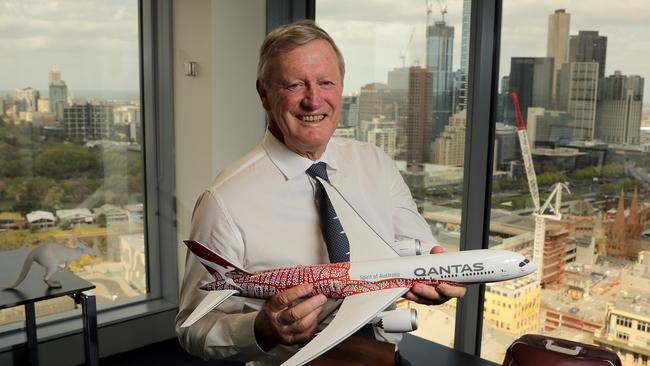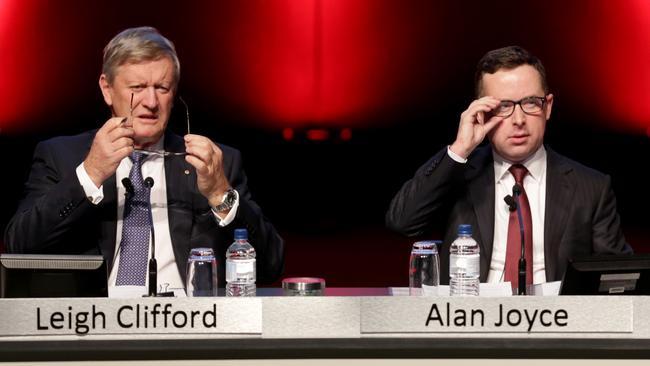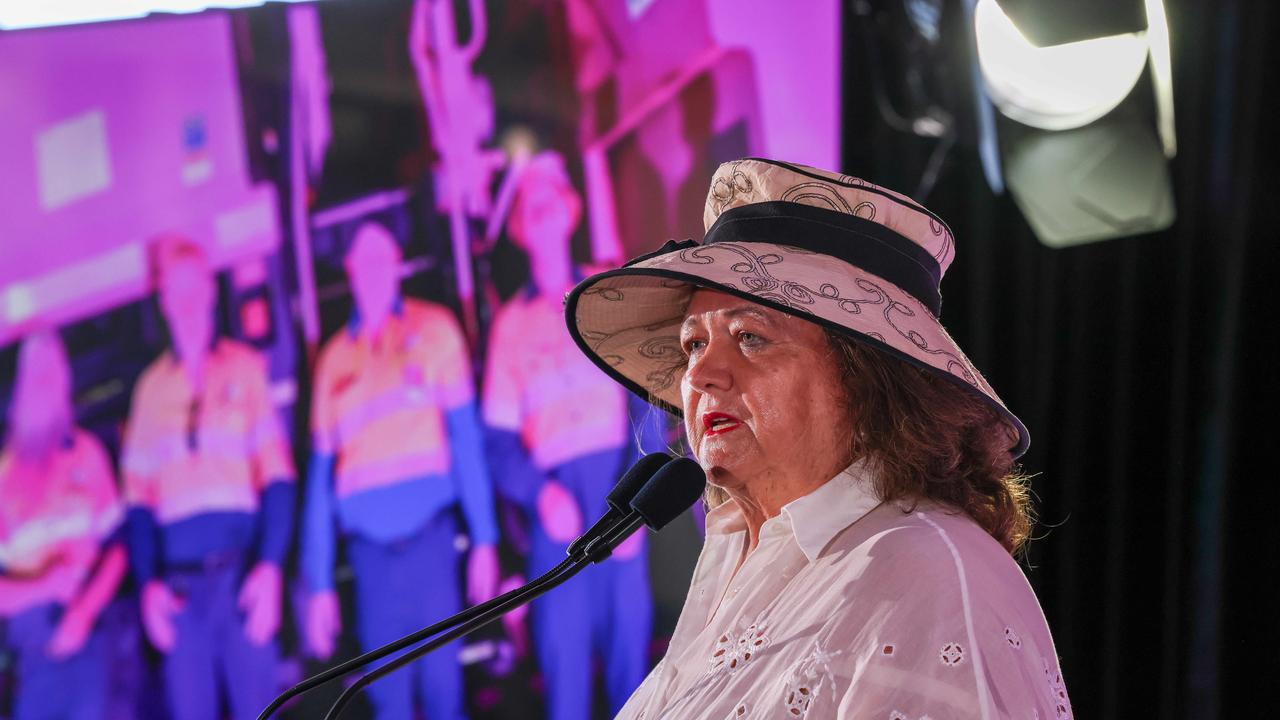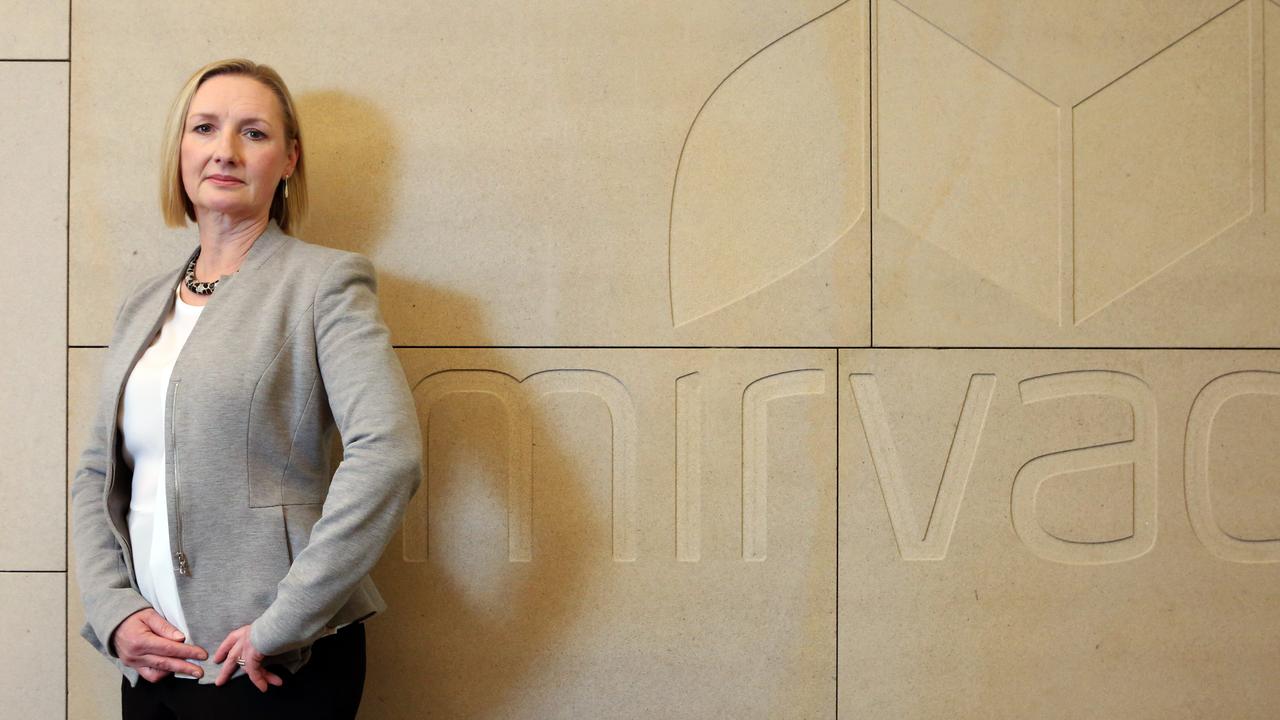Leigh Clifford cleared for takeoff after a decade at Qantas
When Qantas chairman Leigh Clifford chose Alan Joyce as CEO more than a decade ago, they came from different worlds.

When Qantas chairman Leigh Clifford chose Alan Joyce to join him in piloting the national carrier more than a decade ago, they came together from entirely different worlds.
Clifford was the son of a South Australian banking executive, a former Australian rules footballer and mining engineer who became the hard man of the Hunter Valley during his reign as the chief executive of Rio Tinto.
These days he’s known as a respected blue-blood member of the Melbourne corporate establishment.
Joyce, 18 years Clifford’s junior, was a mathematical whiz who hailed from the outer Dublin suburb of Tallaght, where he inherited his unique Gaelic sense of humour.
He packs his jogging gear wherever he goes in the world. He’s been unashamedly a supporter of same-sex marriage. And openly gay.
“When I appointed (Alan) I didn’t know he was gay. No one ever said it to me … I never thought to ask,’’ the now 70-year-old Clifford tells The Weekend Australian in a wide-ranging interview. So how did he find out?
“Somebody told me,” Clifford quips, with his trademark frankness. “I didn’t ask Alan afterwards. I guess it happened by osmosis. Someone said to me: ‘Did you know Alan is gay?’
“And I thought to myself ‘That is why Shane (Joyce’s long-term partner Shane Lloyd) is around.’ … Look, it wasn’t a big deal to me.” Given his background, Clifford’s water-off-a-duck’s back approach to Joyce’s sexuality says something about why they’ve been able to form one of the best partnerships seen at the helm of top Australian public company in recent memory. It will come to an end next week when Clifford retires from his role after chairing his final Qantas annual general meeting.
For the company, the duo have focused upon the issues that matter. Together they have stared down the unions, made the hard calls on job cuts, transformed the profitability of the airline and its fleet of aircraft, all while Clifford has totally renewed the board.
But they also stood side-by-side last year as Joyce campaigned vehemently and controversially to promote same sex marriage, even if they disagreed on whether the Australian public should be forced to vote on the issue or not.
Clifford has previously talked of how he carefully canvassed shareholders on the issue and kept the board informed of Joyce’s intentions and moves.
“Leigh approached the marriage equality issue in a very measured way. He talked to the major shareholders and the board, and took the view that it’s something that we should support as a company,” says long-serving Qantas director Barbara Ward.
While Clifford was determined to ensure no Qantas employee felt pressured over or discriminated against on the issue, he stood firm with Joyce.
“A couple of people wanted to come and see me who are pro marriage — that is, a man and a woman — I think they were nervous to come and see me. I think they were a bit surprised I wasn’t more strident. I respect people that are different,’’ Clifford says.
But perhaps Joyce, in his own way, has helped, without he or Clifford even being conscious of it, to soften the hard man of the Hunter Valley over the past 10 years.
Clifford will only rhetorically pose the question of himself, without giving an answer.
“Has he taught me a bit of tolerance? I’d like to think I had that innately. Some would say I did not necessarily,’’ he muses with a smile.
But what Clifford does recount in the powerful story of a panel discussion at headhunting firm Egon Zehnder that he agreed to participate in six months ago with his two daughters — now aged 39 and 41, who both have children — and a Wesfarmers senior executive and her daughter.
On the face of it, it was a very un-Leigh Clifford thing to do.
“There is an enormous emphasis on ensuring women are given a fair go in industry. I understand it. I have two daughters and they are most forthright with me. My daughters appeared on a panel with me about giving women an opportunity in business,’’ Clifford says.
“They let me have it. They didn’t hold back because they were both together.”
Their key point that day was that working women most needed support when their children were toddlers — that was the time, they argued, where companies needed to be focusing their attention.
“I think it is a good point. It is the flexibility that you need,’’ Clifford says.
“I was really glad to do it. It really brought home to me some of the challenges they face,’’ he adds of the panel. “I quite enjoyed it.”
Leadership
Ask Clifford what is the most important thing Joyce has taught him during their decade together at Qantas, he prefers to answer a slightly different question — what he most admires in his CEO.
“Alan is very analytical … I would say that Alan is very decisive. I wouldn’t say I am indecisive. But sometimes I would ring up and say ‘We need to get on with A, B and C and he would say ‘I’ve done that, it’s done!’ I tell you what Alan has got: he has real courage,’’ he says, hinting at his CEO’s famed October 2011 grounding of the airline’s entire fleet and the decision to lock out its staff in response to a union industrial campaign. It was a decision backed to the hilt by Clifford.
In fact some have speculated they are kindred spirits in their shared appetite for a fight.
“I think we are not afraid to grit our teeth,’’ Clifford says with a smile.
Certainly Joyce has taught Clifford the importance of a CEO having a core understanding of the business they are in.
“I say to myself it is very hard to be an airline CEO unless you have real airline experience. You don’t need to have gone to A-Z but gee you need a lot of letters of the alphabet. I think that applies to a lot of businesses that are very technically complex,” he says.
But there are also important things Clifford believes he has taught Joyce. The CEO has described his chairman as an important “sounding board”.
Before he snared the Qantas job, Joyce was CEO of the airline’s budget carrier Jetstar.
But when Clifford took over as Qantas chairman, one of the first things he did was invite Joyce to Qantas board meetings.
“Alan didn't attend the board meetings till I came. I could see he was head and shoulders above everyone else (as a potential CEO candidate). I got him to attend the board. He has learned how a board and chairman operates and how board meetings are conducted. Things that are his domain, things that are my domain … The way he and I interact. I have always said on a board you should be friendly but not necessarily friends because sometimes you have to take a differing view,” Clifford says.
“He has seen the different views and advice that can come to the CEO and the management team by having a capable but independently minded board.”
Barbara Ward says Clifford runs “a very tight ship”.
“The discussion around the board table is very focused and he makes sure we look at issues from a range of angles, until he says something like, ‘I think we’ve given that a fair hearing, let’s move on’,” she says.
Certainly the chair and his CEO have had their share of debates — Clifford prefers not to use the word disagreements.
Qantas twice looked at spinning off its jewel-in-the-crown Frequent Flyer business, in 2008 and 2013. But when management delved into it, it found it would have been a very bad deal for the airline and the loyalty program.
“We had some debates about the frequent flyer spin-off. It never got to the board. And the board I don’t think would have agreed to it,’’ Clifford reveals, before noting that he and Joyce have never had any “coming to Jesus moments”.
“But when times were tough I made it pretty clear ‘We have got to make this a success’,’’ he says.

He recalls the day Joyce came to him to say he had to take $2 billion worth of costs out of the business, which meant 5000 jobs had to go.
“I said we need to get on with it because the reality is the shareholders are not going to give you a hell of a lot of runway to achieve this. I would not call that a difficult exchange, I’d call it a frank exchange,’’ he says.
A three-year time frame for the transformation was outlined to the market.
“A few shareholders had said to me: ‘We noticed that time frame — we are expecting that, Leigh’,’’ he adds.
But Joyce says he always knew Clifford had his back.
“He’s been incredibly supportive, of Qantas and of me personally, when there was a lot of public criticism at the start of our turnaround. That support went a long way to letting management focus on getting the job done,’’ he says.
“I don’t think there’s much doubt that Leigh’s guidance helped us get through some of the toughest periods in Qantas’s history. One of his many sayings, and he’s got a lot of sayings, refers to people’s knees knocking when things get difficult, but his certainly didn’t.”
Today, the airlines shares are trading at $5.59, up from an all-time low near $1 in June 2012.
Joyce has been labelled one of the few rock star CEOs of corporate Australia, given the high profile of the national carrier, his success in running it and his willingness to speak out on social issues.
Clifford is wary of the tag — he’s always been the first to rein in executives he fears are running ahead of themselves. But he’s never had to do that with Joyce.
“Alan is not a bombastic guy by any means. He has gone on and done it,’’ he says.
“In the early days when things were pretty tough I used to sit down with him. My view was to let him know that I had his back.’
But Clifford has always been prepared for Joyce to be the face of the company.
“You don’t want to be competing for the microphone … If I have something to say to my CEO, I will say it in private,’’ he says.
He says he and Joyce have talked often, but that his style is to be subtle — a trait many would again see as very un-Leigh Clifford and contrary to some speculation during his reign that he could be a domineering figure for his CEO and board.
“The way I do it, I say ‘Mate, I think we have to be a bit careful about A, B and C’. It is a bit of a nudge this way or that way.”
Debt regret
If Clifford has one regret, it would be the airline’s move in early 2014 to seek a debt guarantee from the federal government, which meant taxpayers would guarantee to pay Qantas’s outstanding debts should the airline collapse.
The move was widely ridiculed and attacked by Qantas rival, Virgin Australia, which was backed at the time by powerful foreign shareholders Singapore Airlines, Etihad Airways, Air New Zealand and Sir Richard Branson’s Virgin Group.
It was eventually rejected by the federal government, which instead resolved to change parts of the Qantas Sale Act which limits the level of foreign ownership in the airline.
A year later the airline’s successful raising of some $750m in long-term funds on the Australian-dollar unsecured market made something of a mockery of the plea for government support. “We were under the pump a bit when we went to the government looking for a standby facility.
“It was a standby facility. It was portrayed as we were asking for money. We would have actually paid the government money,’’ Clifford says.
“(But) In retrospect I probably would not have embarked upon that (pushing for the guarantee),’’ he says, before adding that Qantas was “under the pump from an airline with government-backed entities ready to pump lots of money into it.”
In July 2014, parliament passed changes to the Qantas Sale Act that allowed an expansion from ownership limits on the airline of 25 per cent for individual investors and 35 per cent for a foreign-owned airline.
But foreign-ownership limits for individuals and foreign airlines remained limited to 49 per cent.
Clifford says Qantas, despite its now robust financial position, is still “fighting without the full suite of ammunition available to us in one of the most competitive industries in the world”.
“A lot of people overseas want to invest in quality airlines … It is important that we have the ability to have a shareholding above the 49 per cent limit … Should you ever need a substantial capital injection for fleet renewal, if we did, it ties one hand behind your back,’’ he says, before acknowledging the issue is an emotional one given the iconic status of Qantas in the national psyche. The airline has parked its push for changes for the time being.
Asked how new Qantas chairman — former Wesfarmers CEO and now Woodside chairman Richard Goyder — will do things differently, Clifford notes Goyder’s success in running a consumer-facing business like Wesfarmers with its big retail chains Coles, Kmart and Target and hardware business in Bunnings.
“I come from a big capital, cyclical, long-term investment industry … I wouldn't call the mining industry consumer-facing. Once (at Rio Tinto) we took out an ad (in the newspapers), I couldn’t find out who (in the company) did it!”
Some have compared Qantas — with its various divisions including Frequent Flyer, International, Domestic, Jetstar and Freight — to the Wesfarmers conglomerate. But Clifford rejects the comparison, stressing Qantas is a single business, where the schedules of the three flying businesses are co-ordinated with each other.
Hectic schedule
He might have just turned 70 but Clifford wants to make one thing clear: he “isn’t stepping off the earth”.
He remains on the board of global engineering firm Bechtel Group, is an adviser to global private equity firm KKR & Co, sits on the National Gallery of Victoria council of trustees and chairs the NGV’s foundation board.
Last year he also became chairman of the former UBS wealth management operation now known as Crestone.
“We are doing well, very well. I am really pleased with how it is going,’’ he says of the fledgling business.
“Because we are separate from the banks, I think we have been a beneficiary of some of the outcomes (of the banking royal commission). I think like any businessman or citizen I have been appalled by some of the things that have unfolded. But I do hope that we as a nation we can pretty quickly re-establish confidence in our banks because they are so important for the economy. The task is there for the CEOs.”
But Clifford says his decade at Qantas will be judged by one fundamentally important metric.
“You will judge me by how the CEO that I and the board have chosen is regarded. The most important role for a chairman of a board is selection of the CEO,’’ he says.
“Admittedly there were some tough times there where a lot of people were blaming Alan for some of the challenges. But I think he has done an outstanding job.”




To join the conversation, please log in. Don't have an account? Register
Join the conversation, you are commenting as Logout